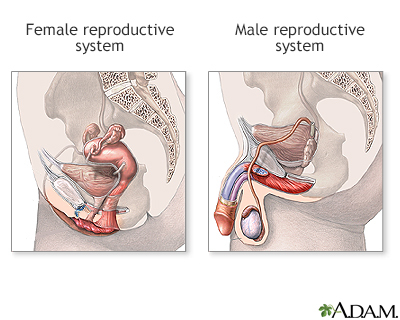Precocious puberty
Definition
Puberty is the time when a person's sexual and physical characteristics mature. Precocious puberty is when these body changes happen earlier than normal.
Alternative Names
Pubertas praecox
Causes
Puberty usually begins between ages 8 and 14 for girls and ages 9 and 16 for boys.
The exact age a child enters puberty depends on a number of factors, including family history, nutrition, and sex.
Most often there is no clear cause for precocious puberty. Some cases are due to changes in the brain, genetic problems, or certain tumors that release hormones. These conditions include:
- Disorders of the testicles, ovaries, or adrenal glands
- Tumor of the hypothalamus (hypothalamic hamartoma)
- Tumors that release a hormone called human chorionic gonadotropin (hCG)
Symptoms
In girls, precocious puberty is when any of the following develop before age 8:
- Armpit or pubic hair
- Beginning to grow faster
- Breasts
- First period (menstruation)
- Mature outer genitals
In boys, precocious puberty is when any of the following develop before age 9:
- Armpit or pubic hair
- Growth of the testes and penis
- Facial hair, often first on the upper lip
- Muscle growth
- Voice change (deepening)
Exams and Tests
The health care provider will perform a physical exam to check for signs of precocious puberty.
Tests that may be ordered include:
Treatment
Depending on the cause, treatment for precocious puberty may include:
- Medicines to stop the release of sexual hormones, to help delay puberty. These medicines are given as a shot (injection). They will be given until the normal age of puberty.
- Surgery to remove a tumor.
Children with early sexual development may have psychological and social problems. Children and adolescents want to be the same as their peers. Early sexual development can make them appear different. Parents can support their child by explaining the condition and how the doctor plans to treat it. Talking to a mental health worker or counselor may also help.
Possible Complications
Children who go through puberty too early may not reach their full height because growth stops too early.
When to Contact a Medical Professional
See your child's provider if:
- Your child shows signs of precocious puberty
- Any child with early sexual development appears to be having problems in school or with peers
Prevention
Adult prescription medicines and dietary supplements that contain hormones should not be consumed by children.
Your child should maintain a healthy weight.
Gallery


References
Garibaldi LR, Chemaitilly W. Disorders of pubertal development. In: Kliegman RM, St. Geme JW, Blum NJ, Shah SS, Tasker RC, Wilson KM, eds. Nelson Textbook of Pediatrics. 21st ed. Philadelphia, PA: Elsevier; 2020:chap 578.
Haddad NG, Eugster EA. Precocious puberty. In: Jameson JL, De Groot LJ, de Kretser DM, et al, eds. Endocrinology: Adult and Pediatric. 7th ed. Philadelphia, PA: Elsevier Saunders; 2016:chap 121.
